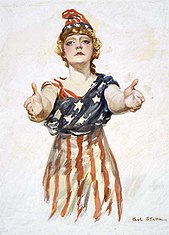アメリカ合衆国の文化
この記事は英語版の対応するページを翻訳することにより充実させることができます。(2024年8月) 翻訳前に重要な指示を読むには右にある[表示]をクリックしてください。
|
アメリカ合衆国の文化(アメリカがっしゅうこくのぶんか、英語: Culture of the United States)とは、アメリカ社会やアメリカ人における価値観、およびそれに付属する制度・法律・生活習慣を一括する用語であり、具体的にはアメリカ国内のあらゆるの思想、言論、宗教、科学技術、理論知識、食文化、祭り、文学、音楽、娯楽、視覚芸術、舞台芸術、社会現象などの総称を指す。
日本語ではアメリカ文化、米国文化、アメリカン・カルチャーなどにも訳される。
概要
[編集]もっとも顕著的な特徴は「全世界の文化が1つの国の中に共存し、共栄している」のことにあり、アメリカ社会自体はまるで小さな地球のようなものである[1][2][3][4]。1776年の建国から現代にかけて、各国の移民に大きな影響を受けてきていて、どの国からの移民が多いほど、米国文化はあの国に近づけるという傾向がある。
アメリカ国内の歴史・地理・人種の構成に基づき、外国からの移民・世界経済の情勢・流行の趨勢の影響を受けつつ、米国特有の文化へ形成し続けている。つまり、地球上のほかの国々とは大きく異なり、アメリカ文化は古来一貫したものでは無く、恒に時代の進歩とともに変化し続けている。かつて正常だと見なされていた文化が、現代では差別だと見なされたり、現代に流行している文化が将来で消えたりする可能性もある。また、社会的弱者が尊厳を持ってアメリカ社会で生きられるように、ホワイトハウスの公式サイトの統計に拠れば、アメリカの国民たちはとくに進歩主義寄りの価値観を包容している[5][6][7][8][9][10][11]。
かつて「文化のるつぼ(Melting Pot)[12][13]」と広く呼ばれていたが、1960年代から文化多様性の高まりにつれて、アメリカ人は自分たちの社会を「サラダボウル(Salad Bowl)[14][15][16][17]」という言葉で形容するようになった。これは各人種や移民が「サラダの中の野菜」のように、それぞれの見た目を保ちつつ、ただ「アメリカの連邦法」というドレッシングにかけられて、味が同じものに統一したという事を意味する[18]。米国の法律は英国の「コモン・ロー」に由来し、同じ法源の下に長く生活してきたから、米国文化はイギリス・カナダ・オーストラリア・ニュージーランドなどの英語圏の白人の民主国家に一番近い[19]。また、これらの多くの民族をコミュニケーションを取りやすいのために、「アメリカ英語」を共通語として使っている[20][21]。
ブリタニカ百科事典に拠れば[22]、米国最初の文化はアメリカ先住民が創った「ネイティブ・アメリカン文化」であったが、現代の米国文化の基盤は西洋にあり、ヨーロッパ人の植民地支配の歴史から由来した[23][24][25]。このため、米国は今でも西洋諸国の一員であり、もしくはそのリーダーとされている。一方、歴史の中で奴隷として扱われた多くのアメリカ黒人や先住民たちは堂々と白人と対抗し、特権階級を弱体化させる社会運動を通じて、1980年代には完全に対等的な地位を手に入れた[26][27][28][29]。不平等の過ちを繰り返さないように、現代のアメリカはポリコレに従って全国の民を「合衆国のファミリーメンバーの一員」として扱い、特定の文化団体や政治集団が支配層を独占し続けることを厳しく禁止する[30][31][32]。
アメリカ文化は人間にとって親しみやすく、一度もアメリカに住んだことが無い人でも、アメリカ文化の中に自分と同じ価値観を大量にみつけることが出来る[33][34][35]。外国人はアメリカ人や米国製のモノをよく観察すると、その考え方を自然に理解し、中の「善・愛・慈悲」といった価値観を深く感じ取ることができる[36][37][38][39][40]。一方、アメリカ国内の50州では、人種・民族・宗教・性別・教育・思想・経済的地位などの交叉により、何百種類の価値観が生み出され、アメリカの国民たちはわざわざ海外へ行かなくても、国内でさまざまな価値観をもつ外国人と直接的に接触することができる。また、アメリカの流行文化や娯楽文化の浸透力はすさまじく[41][42]、人間としての感動と共鳴を引き呼びやすく[43][44]、そのため、1970年代以降、米国は世界から「文化の超大国」と称されるようになっている[45][46]。
脚注
[編集]- ^ “13.7 Cultural Imperialism | Media and Culture”. courses.lumenlearning.com. 2024年8月13日閲覧。
- ^ “How American Culture Ate the World”. The New Republic. ISSN 0028-6583 2024年8月13日閲覧。
- ^ “American Culture: Values, Customs, & More in the USA” (英語). shorelight.com. 2024年8月13日閲覧。
- ^ “American Culture: Symbols, Social Dynamics, Holidays and More” (英語). HowStuffWorks (2024年5月15日). 2024年8月13日閲覧。
- ^ アメリカ政府 (2021-11-01). “TO ADVANCE DIVERSITY, EQUITY, INCLUSION, AND ACCESSIBILITY IN THE FEDERAL WORKFORCE” (英語). GOVERNMENT-WIDE STRATEGIC PLAN (ワシントンD.C.: ホワイトハウス).
- ^ House, The White (2021年6月25日). “Executive Order on Diversity, Equity, Inclusion, and Accessibility in the Federal Workforce” (英語). The White House. 2024年8月13日閲覧。
- ^ “Why Diversity is Important” (英語). Inclusive America (2020年4月23日). 2024年8月13日閲覧。
- ^ careersingov (2024年2月6日). “Diversity and Inclusion in Government | CIG” (英語). Careers in Government. 2024年8月13日閲覧。
- ^ Service, Partnership for Public (2023年3月8日). “How our government can embrace equity to advance women leaders” (英語). Partnership for Public Service. 2024年8月13日閲覧。
- ^ “Diversity, Equity, Inclusion and Accessibility” (英語). U.S. Agency for International Development (2024年3月6日). 2024年8月13日閲覧。
- ^ “The Dandelion Philosophy” (英語). THE DANDELION PHILOSOPHY. 2024年8月13日閲覧。
- ^ laura10757 (2020年10月30日). “Why is America Called the Melting Pot?” (英語). Golden Beacon. 2024年8月13日閲覧。
- ^ Reinsch, William Alan (2024-01-24) (英語). The Melting Pot Boils Over.
- ^ “Salad Bowl - ECPS” (英語). 2024年8月13日閲覧。
- ^ “Melting Pot vs. Salad Bowl Cultural Analogy Differences U.S.” (英語). VoiceTube (2020年4月27日). 2024年8月13日閲覧。
- ^ “Vietnamese Cultural Training - Working Effectively with Vietnamese”. www.culturalsavvy.com. 2024年8月13日閲覧。
- ^ “Melting Pot and Salad Bowl - Engelsk (SF) - NDLA” (ノルウェー語). ndla.no. 2024年8月13日閲覧。
- ^ Thompson, William E.; Hickey, Joseph V. (2004). Society in focus : an introduction to sociology (5th ed.). Boston: Pearson/Allyn and Bacon. ISBN 978-0-205-41365-2
- ^ Hall, Ford W. (1950). “The Common Law: An Account of Its Reception in the United States”. Vanderbilt Law Review 4: 791.
- ^ “Official language of the United States | USAGov” (英語). www.usa.gov. 2024年8月13日閲覧。
- ^ “Most Spoken Languages In The US – WordsRated” (英語) (2024年4月30日). 2024年8月13日閲覧。
- ^ “Native American | History, Art, Culture, & Facts | Britannica” (英語). www.britannica.com (2024年8月5日). 2024年8月13日閲覧。
- ^ “Native American Cultures ‑ Facts, Regions & Tribes” (英語). HISTORY (2023年8月16日). 2024年8月13日閲覧。
- ^ “Native American Traditions” (英語) 2024年8月13日閲覧。
- ^ “Native American History” (英語). www.nativehope.org. 2024年8月13日閲覧。
- ^ Clark, Kenneth (1998年2月9日). “The Civil Rights Era - The African American Odyssey: A Quest for Full Citizenship | Exhibitions (Library of Congress)”. www.loc.gov. 2024年8月13日閲覧。
- ^ “Black Americans' significant economic and civil rights progress threatened, report says” (英語). PBS News (2024年3月1日). 2024年8月13日閲覧。
- ^ “Black Progress: How far we've come, and how far we have to go” (英語). Brookings. 2024年8月13日閲覧。
- ^ Cox, Juliana Menasce Horowitz, Anna Brown and Kiana (2019年4月9日). “2. Views of racial inequality” (英語). Pew Research Center. 2024年8月13日閲覧。
- ^ “The Constitution of Difference” (英語). Harvard Law Review. 2024年8月13日閲覧。
- ^ “Dominant Culture” (英語). The Decision Lab. 2024年8月13日閲覧。
- ^ “Polarization, Democracy, and Political Violence in the United States: What the Research Says” (英語). carnegieendowment.orgundefined. 2024年8月13日閲覧。
- ^ lumolog.com (2024年4月20日). “Pop Culture Pulse: Trends Shaping the Entertainment World” (英語). LumoLog. 2024年8月13日閲覧。
- ^ [email protected] (2023年6月21日). “The Cultural Impact of Immigration in the United States: A Comprehensive Overview” (英語). Atlanta, Georgia Personal Injury and Immigration Laywer | Virguez Law. 2024年8月13日閲覧。
- ^ “Chapter 27. Working Together for Racial Justice and Inclusion | Section 2. Building Relationships with People from Different Cultures | Main Section | Community Tool Box”. ctb.ku.edu. 2024年8月13日閲覧。
- ^ Mathers, Nigel (2016-07). “Compassion and the science of kindness: Harvard Davis Lecture 2015”. The British Journal of General Practice 66 (648): e525–e527. doi:10.3399/bjgp16X686041. ISSN 0960-1643. PMC 4917056. PMID 27364679.
- ^ Edwards, Joyce (2023年11月27日). “Kindness, Humanity, and Empathy: Pass Them On!” (英語). Medium. 2024年8月13日閲覧。
- ^ Zaki, Jamil (2024年4月23日). “Compassion is making a comeback in America” (英語). Vox. 2024年8月13日閲覧。
- ^ “Kindling Goodness: Unveiling How Acts of Kindness Sparked a Global Movement.”. www.linkedin.com. 2024年8月13日閲覧。
- ^ (英語) Acts of Conspicuous Compassion
- ^ “American Pop Culture Is American Empire” (英語). www.theswaddle.com. 2024年8月13日閲覧。
- ^ [page ~検証コード:d68ea4b15c81~|Pop Pulse Magazine]. “America: The Entertainment Capital of the World — Is American Pop Culture Still Influencing the World?” (英語). Medium. 2024年8月13日閲覧。
- ^ “American Pop Culture: History & Examples | StudySmarter” (英語). StudySmarter UK. 2024年8月13日閲覧。
- ^ “Popular culture and mass media in the 1950s (article)” (英語). Khan Academy. 2024年8月13日閲覧。
- ^ “Country Profile: United States of America”. BBC News (London). (April 22, 2008) May 18, 2008閲覧。
- ^ Fergie, Dexter (March 24, 2022). “How American Culture Ate the World”. The New Republic. ISSN 0028-6583 July 3, 2022閲覧。.
参考文献
[編集]- Coffin, Tristam P.; Cohen, Hennig, (editors), Folklore in America; tales, songs, superstitions, proverbs, riddles, games, folk drama and folk festivals, Garden City, N.Y. : Doubleday, 1966. Selections from the Journal of American folklore.
- Marcus, Greil (2007). The Shape of Things to Come: Prophecy and the American Voice. Macmillan. ISBN 978-0-312-42642-2. オリジナルの2021-04-12時点におけるアーカイブ。 2021年2月22日閲覧。
- Shell, Ellen Ruppel, Cheap: The High Cost of Discount Culture, New York: Penguin Press, 2009. ISBN 978-1-59420-215-5
- Swirski, Peter. Ars Americana Ars Politica: Partisan Expression in Contemporary American Literature and Culture. Montreal, London: McGill-Queen's University Press (2010) ISBN 978-0-7735-3766-8
- Crunden, Robert Morse (1996). A Brief History of American Culture. M.E. Sharpe. p. 363. ISBN 9781563248658. オリジナルの2021-04-12時点におけるアーカイブ。 2021年2月22日閲覧。
関連項目
[編集]- 1950年代のアメリカ車文化
- アメリカ研究
- アメリカ例外主義
- アメリカン・ドリーム
- アメリカ化
- アメリカーナ
- アメリカ合衆国の社会
- アメリカ帝国主義
- 北米のエチケット
- アメリカ合衆国の民間伝承
- アメリカ合衆国の慈善活動
- アメリカ人のステレオタイプ
外部リンク
[編集]- Customs & Culture in the U.S. at the Wayback Machine (archived 2011-07-19)
- American Culture Education at the Wayback Machine (archived 2013-05-25)
- Life in the USA: The Complete Guide for Immigrants and Americans at the Wayback Machine (archived 2021-04-21)
- Guide to American culture and customs for foreign students (U.S. Army Intelligence) at the Wayback Machine (archived 2017-01-27)
- CommonCensus Map Project at the Wayback Machine (archived 2011-06-27) – Identifying geographic spheres of influence


 French
French Deutsch
Deutsch












